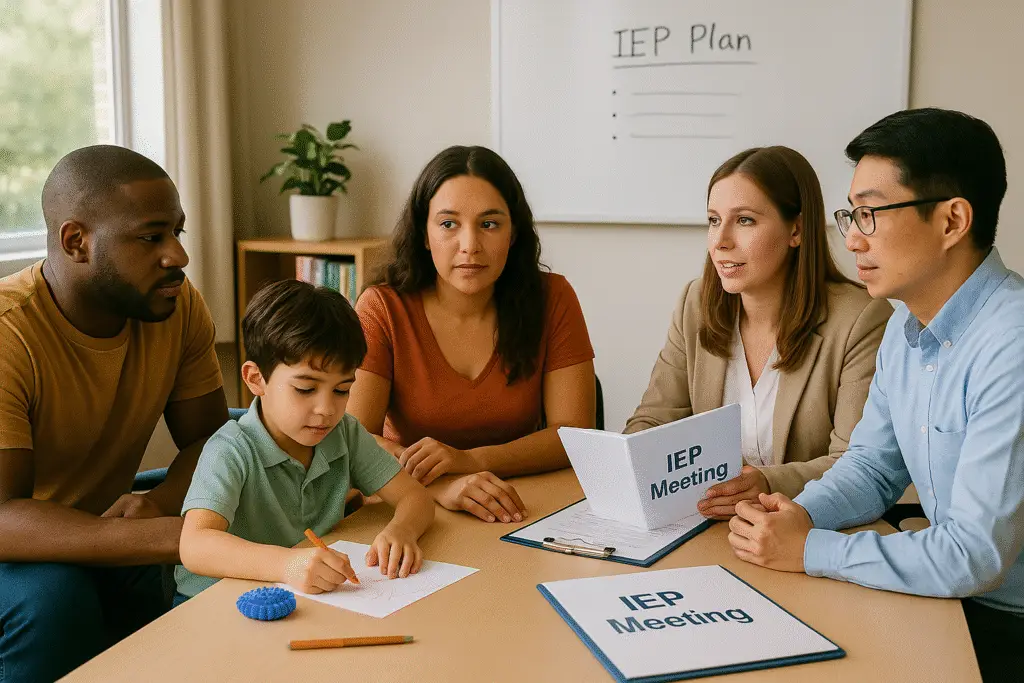Advocating for your child in an Individualized Education Program (IEP) meeting can feel overwhelming, but with the right preparation and communication strategies, you can ensure your child gets the support they need. This guide will help you navigate the process with confidence.
Preparing for the IEP: What You Need to Know
Before stepping into an IEP meeting, it’s crucial to gather all relevant information about your child’s educational needs. Start by reviewing their current IEP, if they have one, and any recent evaluations or progress reports. Understanding the existing plan will provide you a baseline for discussing what’s working and what might need adjustment. Take note of your child’s strengths and challenges, and be ready to highlight these during the meeting.
Next, familiarize yourself with the IEP process and terminology. Knowing the roles of each team member and the specific services your child is entitled to can empower you to ask informed questions. Consider reaching out to parent advocacy groups or educational consultants who can provide guidance specific to your child’s needs. Online resources and local workshops are also excellent ways to expand your understanding.
Lastly, prepare a list of goals and objectives you wish to discuss. Prioritize what’s most important for your child’s development, whether it’s academic support, social skills, or accommodations for physical needs. Having a clear agenda will help you stay focused during the meeting and ensure that all your concerns are addressed.
Effective Communication: Tips for a Successful Meeting
Clear and effective communication is key to advocating successfully in an IEP meeting. Begin by establishing a positive rapport with the IEP team. Remember, everyone at the table shares the same goal: to support your child’s educational journey. Approach the meeting with a collaborative mindset, and be open to input from teachers and specialists who bring valuable perspectives.
During the meeting, actively listen to what each team member has to say. Use reflective listening techniques to ensure you understand their points, and don’t hesitate to ask clarifying questions. If you feel overwhelmed, take a moment to process the information before responding. This approach will help you address concerns constructively without escalating tension.
Be assertive, yet respectful, when discussing your child’s needs. Use data and examples from your child’s experiences to back up your points. For instance, if you believe your child requires more speech therapy sessions, provide examples of communication challenges they face at home or in school. By presenting concrete evidence, you strengthen your case and help the team see your child’s needs more clearly.
Building a Supportive Team: Key Strategies
Creating a successful IEP requires building a supportive team around your child. Start by identifying key allies within the school system, such as a teacher who understands your child’s needs or a school counselor who can provide additional insight. Cultivating these relationships ensures that you have advocates who can assist in implementing the IEP effectively.
Consider involving outside experts if needed. An educational psychologist or therapist who has worked with your child can offer valuable recommendations and can sometimes join the meeting to lend their expertise. As educational consultant Dr. Jane Smith advises, “Bringing in external professionals can provide a fresh perspective and help bridge any gaps in understanding between parents and school staff.”
Finally, follow up after the meeting to maintain momentum. Request a draft of the IEP for your review, and don’t hesitate to suggest revisions if necessary. Schedule regular check-ins with teachers and staff to monitor your child’s progress and address any emerging issues promptly. A proactive approach ensures that the IEP remains a dynamic tool tailored to your child’s evolving needs.
Successfully advocating for your child in an IEP meeting is a collaborative effort that requires preparation, effective communication, and teamwork. By staying informed and engaged, you can help create an educational plan that truly supports your child’s growth and development. Don’t hesitate to reach out for support when needed, and remember, you know your child best.
Meta Description: Learn how to advocate effectively for your child in an IEP meeting with preparation tips, communication strategies, and expert advice.

